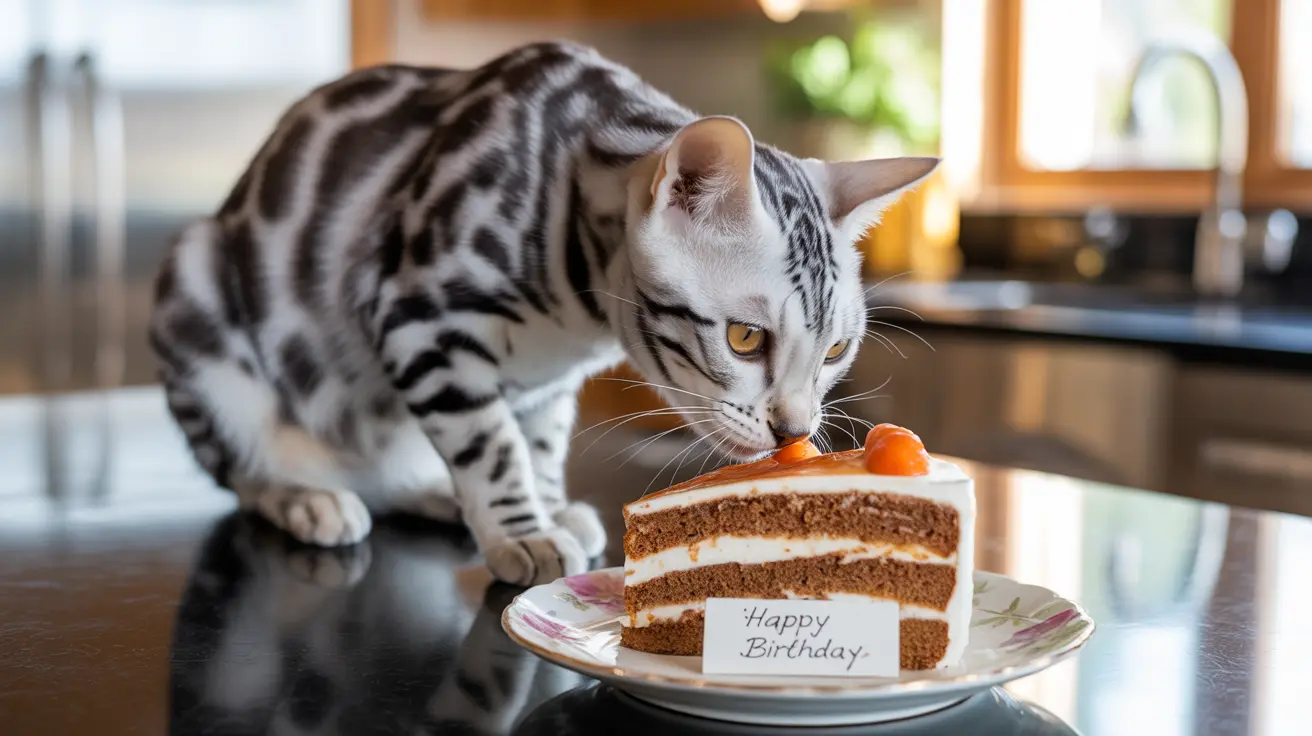Understanding the Dangers of Carrot Cake for Cats
As cat owners, we often want to share our treats with our feline friends. However, when it comes to carrot cake, it's crucial to understand why this human dessert can be dangerous for cats. While the occasional tiny crumb might not cause immediate harm, carrot cake contains several ingredients that range from unhealthy to potentially toxic for our feline companions.
Cats are obligate carnivores, meaning their bodies are designed to process and utilize nutrients primarily from animal-based proteins. Their digestive systems aren't equipped to handle the complex carbohydrates, sugars, and fats found in baked goods like carrot cake, making it both nutritionally inappropriate and potentially harmful.
Dangerous Ingredients in Carrot Cake
Toxic Components
Several common carrot cake ingredients can be toxic to cats:
- Raisins and grapes (often included in recipes) can cause severe kidney damage
- Nutmeg contains myristicin, which can lead to neurological problems
- Certain spices like cinnamon can cause gastrointestinal distress
- Cream cheese frosting contains lactose, which many cats can't digest
Non-Toxic but Harmful Elements
Even ingredients that aren't explicitly toxic can cause health issues:
- High sugar content can contribute to feline diabetes and obesity
- Excessive fats may lead to pancreatitis
- Refined flour offers no nutritional value and can contribute to weight gain
- Artificial sweeteners and preservatives may cause digestive upset
What Happens If Your Cat Eats Carrot Cake?
If your cat manages to sneak a bite of carrot cake, the severity of potential reactions depends on several factors:
- Amount consumed
- Specific ingredients present
- Your cat's individual sensitivities
- Presence of toxic ingredients like raisins
Immediate Steps to Take
If your cat has consumed carrot cake:
- Check the ingredients list if possible
- Monitor for signs of distress
- Contact your veterinarian immediately if the cake contained toxic ingredients
- Watch for symptoms like vomiting, diarrhea, or unusual behavior
Healthy Alternatives to Carrot Cake for Cats
Instead of sharing carrot cake, consider these safer options:
- Small pieces of plain, cooked chicken
- Commercial cat treats formulated for feline nutrition
- Tiny amounts of plain, cooked carrots (if your cat shows interest)
- Veterinarian-approved cat-specific treats
Frequently Asked Questions
Can cats safely eat carrot cake or any type of cake?
No, cats should not eat carrot cake or any type of cake. These desserts contain ingredients that can be harmful or toxic to cats and provide no nutritional benefit for felines.
What ingredients in carrot cake are harmful or toxic to cats?
Raisins, grapes, nutmeg, and certain spices are toxic to cats. Additionally, sugar, fats, and dairy products in frosting can cause health issues like diabetes, obesity, and digestive problems.
What should I do if my cat accidentally eats carrot cake containing raisins or nuts?
Contact your veterinarian immediately, especially if the cake contained raisins or nuts. Monitor your cat for signs of distress such as vomiting, lethargy, or changes in urination patterns.
Are cooked carrots a safe and healthy treat for cats compared to carrot cake?
Plain, cooked carrots can be safe in very small amounts, but they're not nutritionally necessary for cats. Unlike carrot cake, plain carrots don't contain harmful ingredients, but they should only be given as an occasional treat.
Why is carrot cake nutritionally unsuitable for cats and potentially dangerous?
Carrot cake is unsuitable because cats are obligate carnivores requiring animal-based proteins. The high sugar, fat, and carbohydrate content in carrot cake can lead to obesity and diabetes, while certain ingredients can be toxic.
Conclusion
While carrot cake might be a delicious treat for humans, it's clear that it has no place in a cat's diet. The risks far outweigh any potential enjoyment your cat might get from this dessert. Instead, focus on providing your feline friend with appropriate, nutritionally balanced cat food and vet-approved treats designed specifically for their dietary needs.






